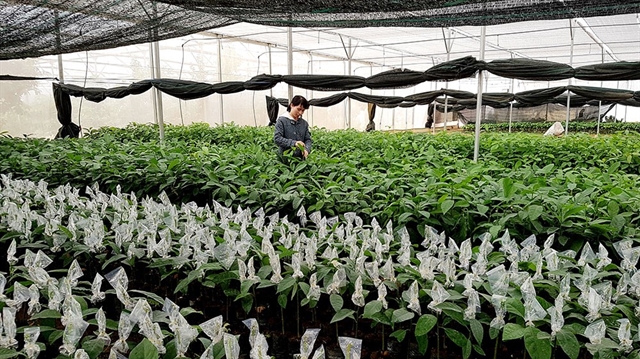 Environment
Environment

Scientific research and technology transfer for the forestry sector in the 2021-30 period will focus on the hybridisation of new varieties, giving priority to planting high-yield, good-quality and pest-and-disease preventive capable tree varieties, said Deputy Minister of Agriculture and Rural Development Hà Công Tuấn.

|
| Scientific research and technology transfer for the forestry sector in 2021-2030 will focus on the hybridisation of new varieties. — VNA/VNS Photo |
HÀ NỘI — Scientific research and technology transfer for the forestry sector in the 2021-30 period will focus on the hybridisation of new varieties, giving priority to planting high-yield, good-quality and pest-and-disease preventive capable tree varieties, said Deputy Minister of Agriculture and Rural Development Hà Công Tuấn.
Tuấn was speaking at a recent conference discussing scientific research and technology transfer in forestry in Hà Nội.
The deputy minister said science and technology was an important driving force for faster and more effective development of the forestry sector.
Thanks to science and technology, the forestry sector has enjoyed rapid and sustainable development in recent years, he said, adding that forest coverage nationwide in 2020 may reach 42 per cent.
He said in the years to come, research institutes need to invest more in studying genes to create new breeds, biotechnology, crop diseases and ecosystems, especially natural forest ecosystems.
However, he said, scientific advances in forestry production still faced big challenges, as many solutions in processing and preserving forest products from research institutes were still tough for enterprises to access.
Therefore, research units must be more clearly oriented in science and technology investment in this field, said the deputy minister.
Scientists have not had in-depth research on forest monitoring, protection, fire prevention and fighting, according to the deputy minister, while new technology applications in management are also limited.
Võ Đại Hải, director of the Việt Nam Forest Science Institute, said that in 2011-20, there has been a change in improving the economic value and sustainable development of the forestry sector.
Over the past 10 years, scientific and technological research have contributed to creating good-quality products that have been applied in practice.
There were 134 new varieties of plants, 27 technical innovations recognised by the ministry, and 83 Vietnamese standards built on agriculture and the forestry sector.
Nguyễn Thị Bích Ngọc, deputy director of the institute, also pointed out the limitations of current scientific and technological transfer.
The work of research has still not met the needs of production practices, especially the supply of high-quality seedlings for afforestation in ecological regions.
Luring top scientists to local research institutes still faces difficulties when hiring policies are unattractive, and there are no specific policies to attract science and technology workers from abroad to work in Việt Nam. — VNS




